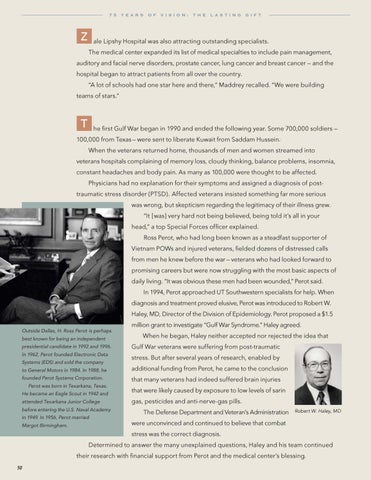75 YEARS OF VISION: THE LASTING GIFT
Z
ale Lipshy Hospital was also attracting outstanding specialists. The medical center expanded its list of medical specialties to include pain management,
auditory and facial nerve disorders, prostate cancer, lung cancer and breast cancer — and the hospital began to attract patients from all over the country. “A lot of schools had one star here and there,” Maddrey recalled. “We were building teams of stars.”
T
he first Gulf War began in 1990 and ended the following year. Some 700,000 soldiers —
100,000 from Texas — were sent to liberate Kuwait from Saddam Hussein. When the veterans returned home, thousands of men and women streamed into veterans hospitals complaining of memory loss, cloudy thinking, balance problems, insomnia, constant headaches and body pain. As many as 100,000 were thought to be affected. Physicians had no explanation for their symptoms and assigned a diagnosis of posttraumatic stress disorder (PTSD). Affected veterans insisted something far more serious was wrong, but skepticism regarding the legitimacy of their illness grew. “It [was] very hard not being believed, being told it’s all in your head,” a top Special Forces officer explained. Ross Perot, who had long been known as a steadfast supporter of Vietnam POWs and injured veterans, fielded dozens of distressed calls from men he knew before the war — veterans who had looked forward to promising careers but were now struggling with the most basic aspects of daily living. “It was obvious these men had been wounded,” Perot said. In 1994, Perot approached UT Southwestern specialists for help. When diagnosis and treatment proved elusive, Perot was introduced to Robert W. Haley, MD, Director of the Division of Epidemiology. Perot proposed a $1.5 Outside Dallas, H. Ross Perot is perhaps best known for being an independent
million grant to investigate “Gulf War Syndrome.” Haley agreed. When he began, Haley neither accepted nor rejected the idea that
presidential candidate in 1992 and 1996.
Gulf War veterans were suffering from post-traumatic
In 1962, Perot founded Electronic Data
stress. But after several years of research, enabled by
Systems (EDS) and sold the company to General Motors in 1984. In 1988, he
additional funding from Perot, he came to the conclusion
founded Perot Systems Corporation.
that many veterans had indeed suffered brain injuries
Perot was born in Texarkana, Texas. He became an Eagle Scout in 1942 and attended Texarkana Junior College before entering the U.S. Naval Academy in 1949. In 1956, Perot married Margot Birmingham.
that were likely caused by exposure to low levels of sarin gas, pesticides and anti-nerve-gas pills. The Defense Department and Veteran’s Administration
Robert W. Haley, MD
were unconvinced and continued to believe that combat stress was the correct diagnosis.
Determined to answer the many unexplained questions, Haley and his team continued their research with financial support from Perot and the medical center’s blessing. 50
